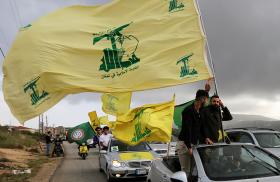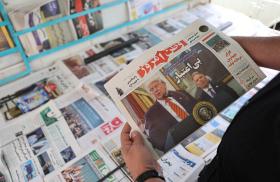The International Court of Justice (ICJ) is set to rule tomorrow on the longstanding border dispute between two Persian Gulf sheikdoms, Qatar and Bahrain. This dispute has preoccupied the ruling families in both countries for decades. It and the much better known IraqKuwait border dispute (not detailed here) are hardly the only ones on the Arabian Peninsula. Indeed, almost every country on the peninsula has or until very recently, has experienced a disagreement over border demarcation.
Qatar and BahrainWith the Gulf Cooperation Council (GCC) unable to resolve the territorial dispute between Qatar and Bahrain, Qatar unilaterally referred the case to the ICJ in 1991. Both Qatar and Bahrain claim sovereignty over the potentially oil rich Hawar islands (controlled by Bahrain since the 1930's), the town of Zubarah on the mainland (currently controlled by Qatar), the island of Janan, and a series of uninhabitable reefs important for establishing the baseline for the maritime boundary.
Bahrain claims that despite the proximity of the territory to Qatar, sustained Bahraini presence on the Hawar islands carries greater legitimacy for its own claims to sovereignty. The dispute dates back more than a century when the current Bahraini ruling family controlled much of what is now western Qatar. The dispute reached its climax in 1986 when armed conflict was avoided only with Saudi intervention.
Bahrain is adamant over its claim to this territory and has been noncommittal about whether it will accept the ruling of the court. In December 1999, a joint committee, co-chaired by the crown princes of the two countries, was established in a bilateral attempt to resolve the dispute. Qatar promised to withdraw its case from the ICJ if the committee achieved an agreement. However, the work of the committee was suspended in May 2000, with plans to resume following the court's ruling, if necessary.
Yemen and Saudi ArabiaOn June 12, 2000, Saudi Arabia and Yemen signed the Jeddah Treaty, which defined the international land and sea borders between the two countries. Yemen received over 40,000 square kilometers of territory in the eastern sector of the disputed region and 3,000 square kilometers in the Red Sea, including four disputed islands. Saudi Arabia received reaffirmation of a clause in the 1934 Taif Treaty, which transferred Yemen's three northernmost provinces to Saudi Arabia temporarily, by some interpretations. But the Jeddah Treaty did not fully resolve the border location in the disputed area near the Omani frontier; it stated instead that the two parties have agreed to demarcate the border in an amicable way, and it specified seventeen coordinates which, if linked together, would constitute the borderline. In addition, there were reports that local tribes, invoking a 241-year-old tribal agreement, contest the treaty's border demarcation in the region from the Red Sea to Jabal al-Thar.
The Jedda Treaty states, "both countries confirm existing obligations whereby their territories will not be used as bases or centers of aggression against the other; nor will they be used for political, military, or propaganda purposes against the other party." Some reports indicate that Saudi authorities have contacted leaders of the Yemeni opposition, informing them of the cessation of Saudi support and advising them to return home. However, progress on implementing the agreement has been slow. Saudi Arabia still has troops posted inside Yemeni territory, and there are no confirmed reports that the troops at the border region were pulled back by the promised date of February 28.
Iran and United Arab Emirates (UAE)Iran and the UAE each claim three islands in the Persian Gulf namely, Abu Musa and the Greater and Lesser Tunbs. Located approximately thirty-four miles from the UAE and forty-three miles from Iran, Abu Musa has a population of less than one thousand. Days before the UAE's independence from Britain in 1971, Iran landed troops on Abu Musa; an agreement was reached at that time under which the island came under co-sovereignty of the two countries. Since 1992, however, Iran has taken steps toward unilateral control, objecting to the increase in foreign nationals coming to the island. Iran has also restricted outside access, built an airstrip, and increased its military presence on the island.
The Greater and Lesser Tunbs are uninhabited islands located in strategic international shipping lanes. Within the loose federation that is the UAE, the emirate of Ras al Khaimah claims the Greater and Lesser Tumbs, and the emirate of Sharjah claims Abu Musa. Both advocate a tougher line against Iran than does the much larger emirate of Dubai, which does 20 percent or more of its non-oil trade with Iran. The UAE federal government, largely under the control of the largest and most oil-rich emirate of Abu Dhabi, supports referring the dispute to the ICJ. Iran rejects international arbitration, wanting instead to handle the dispute in bilateral "dialogue with the Emirates based on the 1971 accords." The GCC established a tripartite committee about the dispute in July 1999 comprised of the foreign ministers from Qatar, Saudi Arabia, and Oman. Iran has refused to meet with this committee.
Saudi Arabia/Qatar/UAE At independence in 1971, the UAE, supported by ex-colonial power Britain, maintained that its border extended in the west as far as the Qatari border (at the inlet at Khwar Udaid); most maps printed in Britain to this day show such a border. Saudi Arabia, however, claimed that it was the only country having a land border with Qatar, and that the territory around Khwar Udaid and to the east was Saudi; that is, the only way to go from Qatar to UAE by land required passing through Saudi territory.
A secret 1974 agreement made public only in 1995 gave Saudi Arabia a fifteen-mile coastline east from Khwar Udaid in return for Saudi abandonment of its claims to an oasis known to Saudis as the Al Buraymi Oasis what is now the city of Al Ain on the border between the emirate of Abu Dhabi (indeed, the home town of the emir). The 1974 agreement also allocated to Saudi Arabia all income from the 14 billion barrel Shaybah-Zarrarah oil field that straddles the UAESaudi border in the disputed area. That provision has always rankled Emiratis. In March 1999, the UAE boycotted the Saudi-hosted meeting of the GCC oil ministers in March 1999 held at the same time and place as the inauguration of the Shaybah field by Crown Prince Abdullah requesting that an output sharing agreement be put in place for the oil and gas produced at the Shaybah field. Relations between the two states had already been damaged by the UAE's disappointment with Riyadh's improvement in relations with Iran, which occurs in the face of the continuing IranUAE dispute about the three Gulf islands.
Saudi Arabia and Qatar's ruler agreed in 1965 to delimit their boundary from Duhat as-Salwa in the west to Khwar Udaid on the Gulf in the east. (Qatar was then a British protectorate and Britain did not recognize the agreements, preferring to uphold Abu Dhabi's claim.) However, a 1992 clash between Saudi Arabia and Qatar claimed three lives; Qatar accused Saudi Arabia of attacking a border post at Khafus, while the Saudis stated that the clash took place inside Saudi territory between Bedouins from the two countries. In 1996, Saudi Arabia and Qatar signed a border demarcation agreement, and the two states completed the process in June 1999, signing demarcation maps of their common borders.
Maritime Boundaries in the Northern GulfIn January 2000, Iran began drilling in the Dorra gas field in the Persian Gulf in an area claimed by both Kuwait and Saudi Arabia, only to stop three months later in response to their protests. Kuwait and Saudi Arabia concluded an agreement in July 2000 demarcating their maritime border. The accord gives Kuwait sovereignty over the islands of Umm al-Maradim and Quruh with a one-mile radius around each. Submarine gas reserves, estimated at 370 billion cubic meters, will continue to be shared between the two nations. For its part, Iraq protested the SaudiKuwaiti agreement, announcing that it will not recognize any deal that does not take into account the territorial rights of Iraq.
Ramin Seddiq is a research intern at The Washington Institute.
Policy #525


